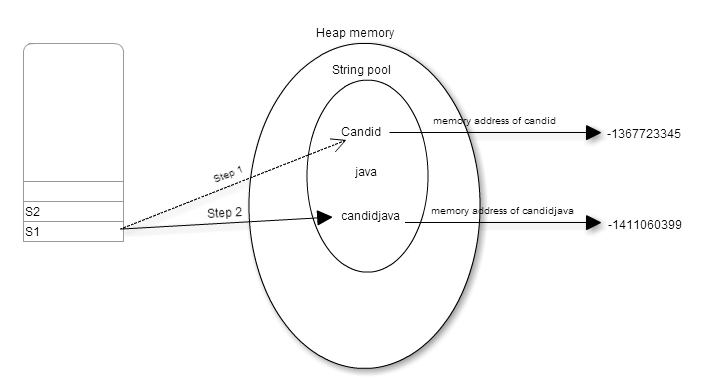Why Are Strings Immutable in Java? Important Knowledge for Programmers
Why Are Strings Immutable in Java? Important Knowledge for Programmers
Blog Article
Discovering the Benefits of Unalterable Strings in Modern Programs Paradigms
In the world of contemporary shows standards, the idea of unalterable strings stands as a keystone of robust software advancement. By taking on immutable strings, programmers can guarantee boosted information honesty, enhanced string safety and security, simplified debugging procedures, enhanced safety and security steps, and efficient performance optimization.
Boosted Information Integrity

By stopping the modification of string items, immutability eliminates the risk of unintentional adjustments to the information they hold. This not just improves the security of the details yet also enhances the reliability of the code that depends on these strings.
Immutability also supports much safer multithreading environments, as concurrent access to unalterable strings does not pose the threat of information corruption via synchronised adjustments. This residential or commercial property simplifies the procedure of dealing with strings in identical shows situations.
In essence, immutability functions as a protective shield around the information kept within strings, boosting their integrity by making sure that when specified, their values remain the same throughout the program's execution.

Boosted String Safety
Unalterable strings boost the thread safety and security of programs by guaranteeing that once a string object is developed, its value can not be changed. This home removes the risk of concurrent threads trying to customize the very same string concurrently, which could result in information corruption or irregular states in the program - Why are strings immutable in Java?. In a multi-threaded setting, where multiple threads accessibility and adjust data concurrently, the immutability of strings supplies a level of safety by guaranteeing that the information remains unchanged throughout its lifecycle
Streamlined Debugging Processes
Given the improved string safety and security assisted in by unalterable strings, a substantial benefit occurs in the realm of simplified debugging procedures. Immutable strings, when created, can not be changed, making it much easier to trace the circulation of information and determine the resource of pests in a program. This immutability makes certain that strings remain consistent throughout the implementation of the program, decreasing the probability of unforeseen changes that might bring about errors.
When debugging with mutable strings, developers usually experience issues where a string's worth is modified unintentionally, making it challenging to pinpoint the root cause of an insect. However, with immutable strings, the information continues to be unmodified, enabling programmers to concentrate on assessing the real reasoning of the code instead of locating where and when a string was changed incorrectly.
In addition, unalterable strings simplify the debugging procedure by making it possible for less complicated recreation of pests. Given that unalterable strings do not alter state, designers can recreate and study insects better, resulting in quicker recognition and resolution of problems within the codebase. This structured debugging operations inevitably contributes to greater software program quality and boosted general advancement performance.

Raised Security Steps
Enhancing information security and strengthening system stability, check it out the use of unalterable strings in software program applications adds significantly to raised protection procedures. Unalterable strings likewise play a vital function in preventing typical safety susceptabilities such as barrier overflows and SQL injection assaults, as attempts to control string data at runtime are naturally restricted.
In addition, the immutability of strings enhances the predictability of program behavior, making it easier to validate inputs and avoid unanticipated modifications that might compromise protection. This predictability simplifies the process of bookkeeping and validating code, enabling designers to recognize possible safety and security loopholes extra efficiently. On the whole, incorporating immutable strings right into software application development methods not just boosts the robustness and reliability of applications yet likewise reinforces their resilience against protection risks.
Effective Efficiency Optimization
Structure upon the foundation of enhanced safety actions attained via the application of unalterable strings, a key element to consider in software application development is efficient performance optimization. When managing mutable strings, procedures like concatenation or substring production commonly result in the creation of brand-new string objects, bring about memory overhead and boosted processing time. However, with unalterable strings, these operations can be enhanced to boost performance. By allowing strings to remain consistent and unchangeable, unalterable strings assist in much better memory management and caching opportunities, ultimately improving the overall efficiency of the software program.
Because immutable strings can not be modified once produced, they can be shared throughout threads without the danger of unanticipated this article changes, lowering the requirement for synchronization devices and improving concurrency. Unalterable strings streamline debugging procedures as developers can rely on that a string's worth will certainly remain constant throughout the program's implementation, removing potential errors triggered by mutable state modifications.
Verdict
To conclude, the advantages of utilizing unalterable strings in modern-day shows standards can not be overstated. Improved information stability, improved thread security, simplified debugging processes, boosted protection measures, and reliable efficiency optimization all add to the overall performance of shows jobs. By integrating immutable strings into programs methods, designers can benefit from a more robust and reputable codebase.
Immutability, a vital function of strings in programs languages such as Java and Python, guarantees that as soon as a string things is created, it can not be modified or customized.Immutable strings boost the thread safety and security of programs by guaranteeing that as soon as a string item is developed, its worth navigate to this website can not be changed. Unalterable strings likewise play a vital duty in preventing typical safety vulnerabilities such as buffer overflows and SQL shot attacks, as efforts to adjust string information at runtime are inherently limited.
By enabling strings to remain consistent and stable, immutable strings facilitate much better memory monitoring and caching chances, ultimately increasing the general efficiency of the software.
Immutable strings streamline debugging procedures as developers can rely on that a string's value will certainly continue to be constant throughout the program's execution, eliminating possible errors caused by mutable state changes.
Report this page